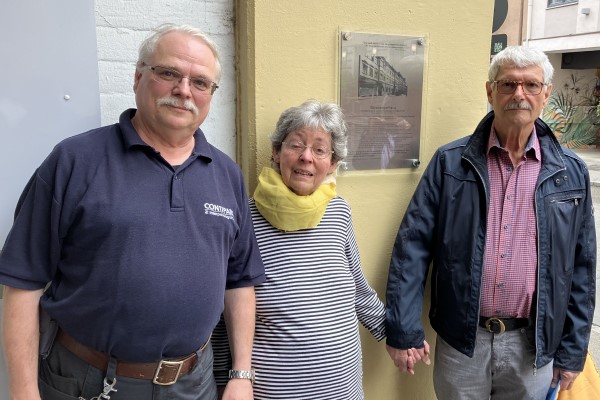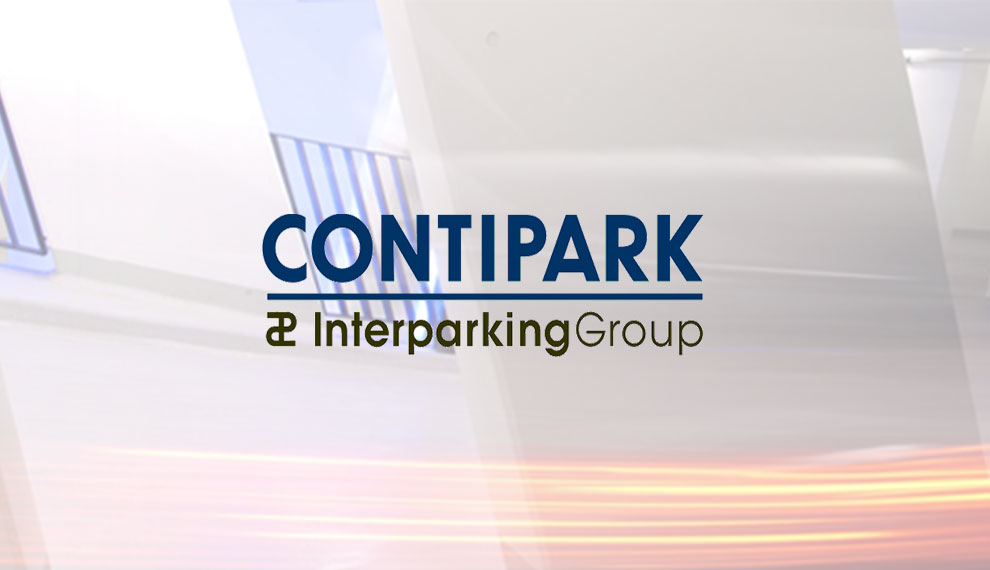Memorial for peace: Commemorative plaque inaugurated at the Contipark car park Ludwigstraße
Car park part of Augsburg’s culture of remembrance
16. May 2022
AUTOR: Presseabteilung (sth)
A commemorative plaque was inaugurated at the Contipark car park “Ludwigstraße” in Augsburg on Friday, 13 May 2022. The car park is located on the site where the company and residential building of a Jewish merchant family expropriated during National Socialism once stood. On the initiative of Miriam Friedmann and Andreas Binswanger, two descendants of this family, and supported by Contipark and the city of Augsburg, the memorial plaque now commemorates the history of the site.
Miriam Friedmann on the initiative, motivation and origins:
“About four years ago, during a walk through the city, knowing full well that over 70 years ago part of my family had their company and residence here, I simply knocked on the door of Mr Berger, operations manager of the Contipark car park in Ludwigstraße, and introduced myself. Right away we understood each other. We had an intensive conversation, and during a second visit the idea for a commemorative plaque was born. After some not unproblematic negotiations and bureaucratic hurdles, everyone involved was firmly convinced that a commemorative plaque should find a place on the façade. In agreement with Andreas Binswanger and with his cooperation, using his “Binswanger Family Archive”, the project could finally be realised.
It was clear to me that if these facts are reported here in connection with the history of the house, it is neither to reproach the later owners nor to make any demands. Rather, we all agreed to contribute through a common task to save our society from a relapse into such barbaric times.
My motivation for this project arises from an image I have carried in my mind since childhood of my grandparents Eugen and Emma (née Binswanger) Oberdorfer, who were persecuted by the Nazis like vermin to be exterminated and disposed of like rubbish in a mass grave in Auschwitz, and of my grandparents Friedmann, who took their own lives the night before they were deported. It was their last free decision.
For many Jewish fellow citizens, there are no places of remembrance, which is why this plaque means more than just a historical citation.
Although our families are separated by continents and generations, this building also serves as a connection and reminder of our roots. It is a commemoration of immense misery suffered in times of oppression. It will be an everlasting testimony to those who lived there.”
Andreas Binswanger on the Binswanger family and the Binswanger House:
“The company “Jacob Binswanger & Cie” operated its vinegar and liqueur production with wine trade here. For five generations, 34 family members lived and worked in this house. On 9 May 1939, the “Jacob Binswanger & Cie Company” was forcibly expropriated together with the Binswanger House as part of the Nazi “Aryanisation”. Before the outbreak of war, a 14-year-old boy from the Binswanger family and his 7-year-old sister were able to flee to England on a “Kindertransport”. Their parents and other family members were later murdered in Auschwitz and Theresienstadt. The Binswanger house was completely destroyed in the night of the bombing on 25-26 February 1944.
The Binswanger family moved their vinegar and liqueur factory from Osterberg, where their factory building had burned down, to this house, then Ludwigstrasse No. D 174, in 1865. They had bought the house, which was built in 1590 by city works foreman Johan Holl, from Alois Seidenschwang.
A book entitled “Das Binswangerhaus” (The Binswanger House), written in 1936 by an unnamed family member, describes the life and work in this house. In it, the history of the Binswanger family and their vinegar and liqueur production is concisely recorded. It is a family history that probably played out in many other Jewish and non-Jewish families until National Socialism became “acceptable” throughout Germany in the 1930s.
The 14-year-old boy mentioned at the beginning was Heinrich Neuburger, grandson of Betty Binswanger. He also wrote his memories of the “Binswanger House” on the occasion of the inauguration of the expanded museum of the Jewish Religious Community on 4 November 2006. In it, he describes how happy his youth was in this house until the pressure of the National Socialist regime on the family grew ever greater. At first they had to retreat into a few rooms within the house in favour of non-Jewish residents. On 28 June 1939, Heinrich and his sister Elisabeth had to leave Germany on the Kindertransport to England. This meant the final separation from his parents. They had to move to a Jewish house in 1939 to be prepared for deportation. They were finally deported on 8 March 1943.
The company “Jakob Binswanger & Cie” was “aryanised” together with the “Binswangerhaus”. In this case, the Binswangers “sold” compulsorily to the “Hotel Drei Mohren AG” by contract of 5 December 1938. The latter continued to operate the business and trade from 9 May 1939. Through the notes on the history of the “Hotel Drei Mohren”, today “Maximilian’s” by author Thomas Wiercinski from 2015, the management of the “Drei Mohren AG” has processed the history of the “Aryanisation” and the purchase of the “Jacob Binswanger & Cie” at that time in an exemplary manner and thus also contributed its part to the remembrance of the atrocities of National Socialism.
The “Binswangerhaus” itself was completely destroyed in the night of the bombing from 25 to 26 February 1944.
Miriam Friedmann, who grew up in the USA and has lived in Augsburg since 2001, and Andreas Binswanger from Kreuzlingen in Switzerland were very keen to commemorate the expulsion and extermination of their Jewish family members here in Augsburg with this memorial in the form of a plaque. Both descendants of the Binswanger family found each other through independent research into their family history.
Miriam Friedmann and Andreas Binswanger were also encouraged by the efforts of the City of Augsburg with its specialist office for remembrance culture and obtained permission from the city to erect this memorial plaque. The company Contipark, which operates the multi-storey car park where the “Binswangerhaus” once stood, also supported the project. We sincerely thank Contipark for the opportunity to install this commemorative plaque. We would also like to thank the City of Augsburg for supporting this project.
The installation of this commemorative plaque should not only contribute to the remembrance of National Socialism, but also to the fight against renewed right-wing nationalist tendencies. For the quote by George Santayana affixed to the plaque reads: “Those who do not remember the past are condemned to repeat it”.
“This remembrance should contribute to understanding and peaceful coexistence between people of different origins and different faiths in Augsburg, the city of peace.”
Contipark Regional Manager Michael Hackl on Contipark’s commitment:
“As a successful company with around 590 parking facilities throughout Germany and Austria, we are aware of our social responsibility. That is why we are involved in numerous projects – whether social, cultural or ecological. We do this especially at the local level. Because here, at our locations, we are local partners – partners of the cities and municipalities, of the local economy, but also and above all of the people. Whether residents, commuters or visitors: they all have a right to a liveable city, which we are happy to shape together with them.
We are therefore very grateful that Miriam Friedmann and Andreas Binswanger took the initiative and drew our attention to the story of the location of our “Ludwigstraße” car park in Augsburg. This urgently needs to be told, all the more so at this time when current developments in Europe show that the danger of history repeating itself is far from being averted. Against this background, too, we are pleased to be able to make a contribution to the culture of remembrance in the city of Augsburg. After all, values such as democracy, peace and the rule of law are part of our company’s self-image. The installation of the commemorative plaque reminds us of precisely these values by raising awareness of how fragile they still are.”
Photo from left to right: Jean Berger (Operations Manager), Miriam Friedmann, Andreas Binswanger, Copyright: Contipark




